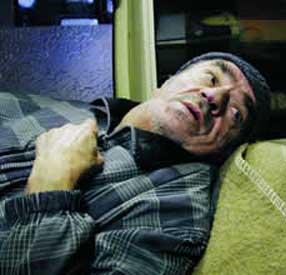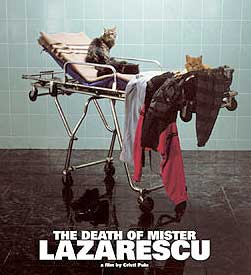Lazaerscu Dante Romica (Ion Fiscuteanu) is a man alone, except for his cats, in a miserable little apartment in Bucharest, so cold he keeps his hat on. He takes ill & with aid of his neighbors attempts to get a hospital to send an ambulance. Waiting & waiting, getting sicker & sicker, he takes scads of antacids, drinks rather too much alcohol, & talks to his scrawny undernourished cats.
 No one quite believes he's ill for the longest while because he's such a drunk. But a paramedic (Luminita Gheorghiu) eventually catches on that it may be serious, & the rest of the film is her in her ambulence trying to find a hospital that will accept an indigent patient. No one quite believes he's ill for the longest while because he's such a drunk. But a paramedic (Luminita Gheorghiu) eventually catches on that it may be serious, & the rest of the film is her in her ambulence trying to find a hospital that will accept an indigent patient.
The Death of Mister Lazarescu (Moartea domnului Lazarescu, 2005) is about the banality of death, the insensitivity of people, & the medicority of the care available to the poor in Roumania, portrayed in part as Virgil's journey through Hell. Lazarescu's middle name Dante is only one of many clues to how you're supposed to think of his journey.
But the script is at the same time based on an absolutely true account & presented with documentarian realism. Shuffled from hospital to hospital, forever irritable & getting little help, losing by stages his hope, his dignity, & his consciousness, Lazarescu finally gets admitted to a hospital where he will succumb to his illness.
It's done in a flat cinema verite style without emotional antics or overstatement. In the end it feels more like a political editorial than a real story. The realism of the central performance is only as moving as one wants it to be; it doesn't force itself on the viewer.
Mr. Lazerscu's predicament is a lot like a step-grandfather of mine, many years ago, who fell out of a fruit tree & landed on a broken bottle. He he was turned away from multiple hospitals for lack of medical insurance until finally taken in by Swedish Hospital which served the poor. By luck alone he had not bled to death on that quest.
A few years later laws were passed that made it illegal for emergency room care to exclude the poor, a law emergency rooms have resented since it has made E.R.s the primary health givers to the homeless. So even now care for the uninsured meets only a legal minimum, & it remains a pay-as-you-go medical system.
My own experience at a time when emergency rooms were legally forced to care for the uninsured occurred some years ago when I had no medical insurance. I turned up at the hospital with pneumonia, having been coughing so hard I broke ribs.
The doctor wanted to hospitalize me immediately but upon discovering I had no insurance, he instead gave me a bottle of free pills, & literally told me to go home and "Pray you don't die." He'd met his legal obligation, & if he could just get me to go home to die there, the hospital would not be futher burdoned.
I'd always presumed European medicine was more accessible than that, but this film suggests otherwise, with the elderly & the poor pretty much screwed no matter where they live. But even relating personally to the subject matter of this film, it struck me as overly politicized & dull viewing.
copyright © by Paghat the Ratgirl
|

 No one quite believes he's ill for the longest while because he's such a drunk. But a paramedic (Luminita Gheorghiu) eventually catches on that it may be serious, & the rest of the film is her in her ambulence trying to find a hospital that will accept an indigent patient.
No one quite believes he's ill for the longest while because he's such a drunk. But a paramedic (Luminita Gheorghiu) eventually catches on that it may be serious, & the rest of the film is her in her ambulence trying to find a hospital that will accept an indigent patient.